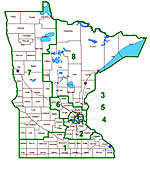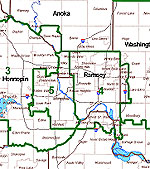Suburbs get more clout from new plan
By Michael Khoo
Minnesota Public Radio
March 19, 2002
New political districts drawn by a special state court panel could pit two of the state's incumbent Congressmen against each other in the fall. The map has paired DFLer Bill Luther and Republican Mark Kennedy in a newly-constituted 6th District. The panel released the Congressional map - along with a new state Legislative map -- Tuesday, after lawmakers failed to meet a deadline for completing the task themselves.
| |
|
|
|
||
The new 6th District begins in the eastern suburbs, curves north over the Twin Cities and into the far western suburbs, where it plucks first-term Republican Mark Kennedy out of his 2nd District. Kennedy now must decide whether to challenge four-term DFLer Bill Luther, or to move a few miles south and re-enter the new 2nd District.
Kennedy declined to comment on the redistricting plan until he's reached a decision, but GOP state party spokesman Bill Walsh says Kennedy would be competitive in either case. He says Luther's new 6th, which extends up Interstate 94 as far as St. Cloud, won't be as friendly to Democrats as the old 6th.
"Without Newport and St. Paul Park, without Columbia Heights and Fridley - these are the little cities that have allowed Bill Luther to stay in Congress. They're no longer in that district. They've been sucked up into Minneapolis and St. Paul districts. It's a very good Republican opportunity," says Walsh.
Luther chief of staff Bob Decheine says if the incumbents do go head-to-head, Luther would still have an edge. Roughly 50 percent of the new district matches areas already represented by Luther, while Decheine says Kennedy would be a newcomer to nearly the entire district. But he says with only a slim Republican majority in the House, the match-up between Republican and Democratic incumbents would be a "battle royale."
"This would be absolutely one of the most closely-watched races in the country. Everybody would be involved in this at the very top echelons of both political parties, because control of the House is that close. It'll be a barn burner," says Decheine.
Although House members are not required to live in the district they serve, Kennedy would almost certainly move a few miles south if he decides to hold on to his 2nd District seat. But a fellow Republican is already staking a claim to that seat.
John Kline nearly defeated Luther twice under the 6th District's old boundaries. He now finds himself in a new 2nd District that's - at least temporarily - without an incumbent. Kline says he expects Kennedy to face Luther while leaving the 2nd open. Kline says that would give Republicans a chance to keep the 2nd and pick up the 6th.
| |
|
|
|
||
"From a partisan perspective, they're both Republican districts," says Kline. "So Congressman Kennedy, whether he runs against Bill Luther or somebody else - if Mr. Luther decides not to run - he ought to be able to win that district and win it handily."
Kline says if Kennedy does want his 2nd District back, the two will sit down to discuss options.
The congressional plan is also noteworthy for creating a new suburban district at the expense of outstate Minnesota. Rep. Colin Peterson of the 7th District - now in his sixth term - says that's a setback for farm interests. Peterson says diminishing rural representation makes it harder to get new farm legislation passed without weighing it down with other issues.
"We've got food stamps and nutrition, we've got conservation. We have to move in a lot of different directions to get enough support to be able to pass a farm bill, where maybe 20 years ago you didn't have to do that," says Peterson.
But supporters of increased metro representation say the court plan simply follows population trends. State Planning Director Dean Barkley is a political ally of Independence Party Governor Jesse Ventura, and served as the governor's point man on redistricting.
"The court's job is to accurately reflect those changes in demographics. And it did this. And I think for the next 20 years, people living in the three rural congressional districts can be assured that they're going to actually have rural representation - one of their own representing them in Congress," says Barkley.
Republicans say they're happy to see a new seat in the suburbs - although they said they'd rather it come from combining Minneapolis and St. Paul into a single district. The court, noting that the two cities have had separate representation since 1891, declined to take that step.
More from MPRMore Information


